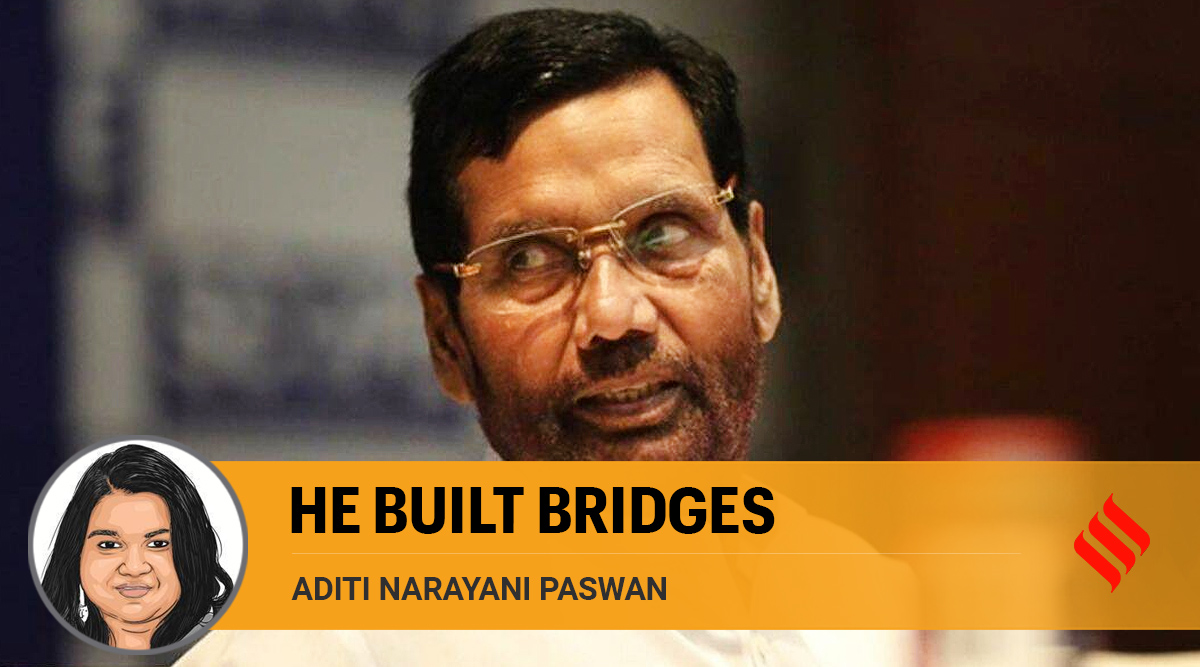The sputtering of sarson (mustard seeds) accompanied by the redolence of crispy pothia (a small river fish) in the household invigorates my senses. As a child these two things reminded me of a cherubic face with an amiable demeanour, beaming with poise and dignity. His visits were always marked by organised chaos in my household. A soulful singer and an ardent follower of Sant Kabir, he would often sing Kabir ke dohe to us with lucidity and would impart important lessons of life, connecting them with Kabir’s teachings.
Being a follower of Kabir, one was expected to abstain from consuming meat or fish and he was constantly called out for eating both. To which he would reply, I am not a Kabirpanthi, we are Kabir ke log. We follow Kabir whose sanctity is not defined by the small circumference of one’s dietary preferences.

Ram Vilasji not only marked his presence in national politics, but also redefined the caste dimensions in Bihar politics. He had set the unique record of being part of almost all the Union governments, serving under six prime ministers between 1989 and 2020, except during 1991-96. His political accomplishments made his contemporary, Lalu Prasad Yadav, once call him the rajneetik mausam vaigyanik (political weatherman), clearly pointing to his political efficacy. He was a collaborationist rather than a confrontationist and owing to his electoral acumen was able to push Dalit politics from the edges of tokenism to the mainstream.
 Paswan began his political career in 1969 as an MLA from the Samyukta Socialist Party and later rose through the ranks of various political parties before forming the Lok Janshakti Party (LJP) in 2000. Today, a day after his birth anniversary, we look back at the extraordinary timeline of his political career and the contributions he made towards society at large and Dalit politics specifically.
Paswan began his political career in 1969 as an MLA from the Samyukta Socialist Party and later rose through the ranks of various political parties before forming the Lok Janshakti Party (LJP) in 2000. Today, a day after his birth anniversary, we look back at the extraordinary timeline of his political career and the contributions he made towards society at large and Dalit politics specifically.
Born on July 5, 1946, in Shaharbanni village of Bihar’s Khagaria district, Paswan was the voice of the oppressed and the marginalised. The reclamation of a space in Lutyens’ Delhi (12 Janpath) represents Dalits being part of the political epicentre of the country, a heterotopia of aspirations, hope and intransigence. Paswan was a product of Lohiaite politics and resigned his assembly ticket on Jayaprakash Narayan’s call for total revolution. He spent time in jail during the emergency, and in 1977, drew attention when he stood against the Indira Gandhi wave from the Hajipur constituency in Bihar and retained his seat with a historic margin of 4.24 lakh.
Most Read 1Chandrayaan-3 mission: Dawn breaks on Moon, all eyes on lander, rover to wake up 2As Indo-Canadian relations sour, anxiety grips Indian students, residents who wish to settle in Canada 3Karan Johar says Sanjay Leela Bhansali did not call him after Rocky Aur Rani: ‘He’s never called me but…’ 4Gadar 2 box office collection day 40: Hit by Shah Rukh Khan’s Jawan onslaught, Sunny Deol movie ends BO run with Rs 45 lakh earning 5Shubh’s tour in India cancelled: Why is the Canada-based singer facing the music?
Paswan was one of the very few political stalwarts who advocated for reservation in the private sphere, comprehending the growing caste consciousness in the political framework. He undertook numerous developmental projects in Bihar when he was in charge of Railways and other ministries, earning him the title of “Vikas Purush”. He also initiated the opening up of the telecom sector, advocating the entry of private players, made advancements in the food procurement system, and laid the infrastructure for the One Nation One Ration Card scheme. He also worked for empowering labourers, and was at the forefront of promoting entrepreneurship among Dalits.
Paswan will be remembered for his pivotal role in the implementation of the Mandal Commission Report in 1990 during the V P Singh government and the prioritisation of social justice-oriented programmes and initiatives. The enthusiasm with which he served the people of his constituency and his endeavours with regard to Dalit emancipation and welfare are unrivalled. His political vision, his tactical nous helped him negotiate with other influential backward caste leaders in Bihar without letting his identity as a Dalit leader be subsumed in the process. Through his politics, he brought the twin concepts of social justice and inclusion — essential for the functioning of a democratic polity — closer.
Also ReadWill reservation really help Indian women?Pratap Bhanu Mehta writes on new Parliament: India’s age of ambitionValues Kota imparted: Anxiety and building a future on a butchered presentWith G20-IMEC plan, the global order shifts to Eurasia
This column first appeared in the print edition on July 6, 2021 under the title ‘He built bridges’. The writer is assistant professor, Maitreyi College and founder of DAPSA (Dalit Aadivasi Professors and Scholars Association)


